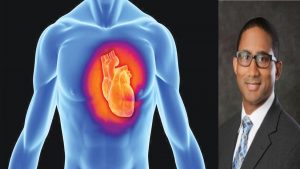CARDIOVASCULAR DISEASE IS THE LEADING CAUSE OF DEATH AND DISABILITY AMONG ALL AMERICANS, BUT BLACK MEN AND WOMEN ARE MORE LIKELY TO DIE OF HEART DISEASE AND STROKE THAN WHITE MEN AND WOMEN.THE GOOD NEWS IS EVEN SMALL CHANGES IN DAILY HABITS CAN REDUCE YOUR RISK OF DEVELOPING A HEART DISEASE, INCLUDING THE MOST COMMON TYPE, CORONARY ARTERY DISEASE.
JOINING US NOW DURING HEART HEALTH MONTH IS INTERVENTIONAL CARDIOLOGIST AND MEMBER OF THE ASSOCIATION OF BLACK CARDIOLOGISTS DR. WAYNE BATCHELOR TO TELL US A LITTLE MORE ABOUT CORONARY ARTERY DISEASE, AND TO SHARE SOME TIPS FOR LIVING A HEART HEALTHY LIFESTYLE.
BIO: Dr. Wayne Batchelor received his B.A. and Doctorate of Medicine degrees summa cum laude at Queen’s University in Kingston, Ontario in Canada. He then completed a Comprehensive Internal Medicine Residency and Fellowship in Adult Cardiology at the University of Toronto and a fellowship in Interventional Cardiology with a Master’s of Health Science Degree in Clinical Research at Duke University.
He is the incoming Director of Interventional Cardiology and Interventional Cardiology Research at the Inova Heart and vascular Institute in Fairfax, Virginia. He has served on the Medical Faculty as an Assistant Professor of Medicine at the University of Toronto and as Associate Professor of Medicine at the Florida State University College of Medicine and has practiced as an interventional cardiologist at St. Michael’s Hospital in Toronto, Ontario Canada and at the Tallahassee Memorial Hospital in Florida.
Dr. Batchelor has given numerous invited lectures, published over 75 peer-reviewed original abstracts/manuscripts, and contributed multiple book chapters. He is a Fellow of the American College of Cardiology and the Society for Cardiac Angiography and Interventions, and was selected to serve on the American College of Cardiology’s (ACC) D2B (Door to Balloon) Task Force, a national committee charged with improving the rapidity of care for heart attack victims across the U.S. He currently serves on the ACC’s Interventional Cardiology Sectional Leadership Council.
His primary expertise is in structural/valvular heart disease, coronary and peripheral arterial disease, carotid artery disease and clinical research in interventional cardiology. He was instrumental in starting the first structural/valvular heart program at Tallahassee Memorial Hospital and served as Chair of its Interventional Cardiology Council. He has a keen interest in radial artery access percutaneous coronary interventions and has performed more than 4,000 radial access coronary stent procedures.
During his career, he has been recognized as the recipient of a number of awards, including the Dr. and Mrs. Sydney P. Schiff Medal in Surgery, Nathan E. Berry Prize in Urology, Sopman Award for Clinical Excellence and Human Compassion, National Research Fellowship from the Heart and Stroke Foundation of Canada, and the Capital Medical Society’s Outstanding Physician of the Year Award in 2017.
He is certified by the American Board of Internal Medicine in Cardiovascular Disease with added qualifications in Interventional Cardiology.


